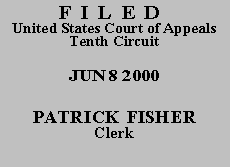

| PAUL EDWIN FREE,
Plaintiff-Appellant,
v.
FEDERAL BUREAU OF PRISONS;
USP, Florence, Colorado; R. E.
HOLT, Warden, USP, Florence,
Colorado Defendants-Appellees. |
No. 99-1520
(D.C. No. 99-Z-1029) (Colorado) |
Mr. Free, a pro se prisoner, filed this action in the District of Colorado pursuant to Bivens v. Six Unknown Named Agents of Fed. Bureau of Narcotics, 403 U.S. 388 (1971), in June of 1999. Mr. Free also filed a motion to vacate, set aside, or correct his sentence pursuant to 28 U.S.C. § 2255 in the Eastern District of Michigan. Mr. Free's Bivens action alleges he was deprived of access to the courts due to the inadequacy of the prison law library, his lack of access to the library, and mail tampering by prison employees. These circumstances, he asserts, made it difficult for him to pursue his section 2255 motion.
On September 21, 1999, the district court issued an order dismissing Mr. Free's complaint as legally frivolous pursuant to 28 U.S.C. § 1915(e)(2)(B). Eight days later Mr. Free filed a Motion for Leave to File a Supplemental Complaint, which was denied by minute order the same day. On October 13, 1999, he filed a Motion to Reconsider both the minute order and the order dismissing the action. The district court denied the motion on October 20, 1999. On November 12, 1999, Mr. Free filed an appeal of the district court's September 21 order dismissing the action. We held that the appeal was not timely filed. Mr. Free now petitions us for rehearing.
We initially held that we lacked jurisdiction to consider Mr. Free's appeal as untimely under Federal Rule Appellate Procedure 4(a)(1)(A), which requires a notice of appeal to be filed within 30 days from entry of the order appealed.(*) Mr. Free's petition for rehearing correctly points out that Federal Rule of Appellate Procedure 4(a)(1)(B) controls here because he is suing a federal government agency. Thus, Mr. Free actually had sixty days to file his appeal from the date the district court entered its September 21 order, and his appeal was therefore timely filed. Consequently, we grant Mr. Free's petition for rehearing,(**) we and proceed to the merits of his appeal.
We review the district court's section 1915(e) dismissal for an abuse of discretion. See McWilliams v. Colorado, 121 F.3d 573, 574-75 (10th Cir. 1997). The court correctly noted that an inmate's right of access to the courts, see Bounds v. Smith, 430 U.S. 817, 828 (1977), only protects an inmate's ability to prepare initial pleadings in a civil rights action regarding his current confinement or in an application for a writ of habeas corpus, see Wolff v. McDonnell, 418 U.S. 539, 576 (1974); Carper v. Deland, 54 F.3d 613, 617 (10th Cir. 1995). The record in this case reveals that Mr. Free did in fact prepare and file a section 2255 action in the Eastern District of Michigan to which the government was ordered to respond. Mr. Free's ability to file an initial pleading was thus not prejudiced by the conduct he challenges here, and his right of access to the courts was not denied. While he asserts that conditions in the prison law library will prejudice his ability to prepare a reply to the government's answer in the section 2255 action, his right of access to the courts does not extend to the preparation of a reply brief. Moreover, as the Supreme Court made clear in Lewis v. Casey, 518 U.S. 343, 351 (1996), "Bounds did not create an abstract, freestanding right to a law library or legal assistance, [and] an inmate cannot establish relevant actual injury simply by establishing that his prison's law library or legal assistance program is subpar in some theoretical sense."
For these reasons, we conclude Mr. Free had no arguable claim under the law.(3) As such, we cannot say the district court abused its discretion in dismissing the complaint as frivolous.
We GRANT Mr. Free's Petition for Rehearing and AFFIRM the judgment of the district court.(4)
ENTERED FOR THE COURT
Stephanie K. Seymour
Chief Judge
*. Instead, we reviewed and affirmed the District Court's October 20 order denying Mr. Free's Rule 60(b) Motion to Reconsider.
**. "Judges are apt to be naïf, simple-minded [people] . . . . We too need education in the obvious . . . ." Oliver Wendell Holmes, Jr., Law and the Court (1913).
3. We will not address claims that Mr. Free failed to raise in the district court.
4. We remind Mr. Free that he is obligated to continue making partial payments toward the amount of fees and costs we assessed on February 7, 2000, until the entire amount has been paid.